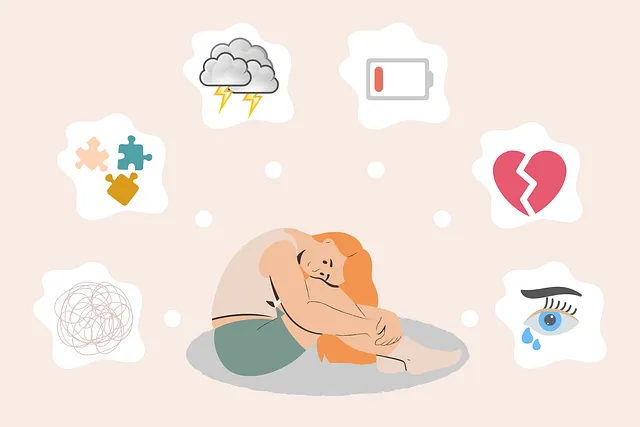Northglenn Kaiser Permanente's mental health department employs the RFM framework—Reach, Resilience, Motivation—using evidence-based exercises for individual needs. They prioritize staff resilience through workshops, peer support groups, and mindfulness practices to reduce stigma and improve job satisfaction. Mindfulness meditation and cognitive behavioral therapy (CBT) are key tools, measured by qualitative and quantitative data, to enhance well-being and productivity in the workforce.
Resilience is a powerful tool for navigating life’s challenges, and RFM (Recovery, Flexibility, and Mastery) offers a structured framework to build mental health resilience. This article explores how the Northglenn Kaiser Permanente mental health department has pioneered an innovative approach using RFM exercises to enhance community well-being. We’ll delve into key techniques, their impact on mental fortitude, and methods for measuring success in resilience programs, drawing insights from this leading practice.
- Understanding RFM: A Framework for Mental Health Resilience
- The Northglenn Kaiser Permanente Approach to Resilience Building
- Key Exercises and Techniques to Enhance Mental Fortitude
- Measuring Success: Evaluating the Impact of Resilience Programs
Understanding RFM: A Framework for Mental Health Resilience

At the Northglenn Kaiser Permanente mental health department, we recognize that building resilience is a cornerstone of overall well-being. The RFM framework—a powerful tool in our arsenal—stands for Reach, Resilience, and Motivation. This holistic approach helps individuals cultivate inner strength development by focusing on extending their comfort zones (Reach), enhancing their ability to withstand challenges (Resilience), and maintaining the drive to pursue personal growth (Motivation).
Through a range of evidence-based exercises tailored to individual needs, we guide patients through confidence boosting emotional healing processes. These activities are designed to empower individuals to navigate life’s stressors with greater ease, fostering mental agility and a deeper understanding of their emotional responses. By embracing the RFM framework, our team at Northglenn Kaiser Permanente is dedicated to helping individuals unlock their inherent capacity for resilience.
The Northglenn Kaiser Permanente Approach to Resilience Building

The Northglenn Kaiser Permanente mental health department takes a holistic approach to resilience building, recognizing that healthcare providers’ well-being is crucial for delivering optimal patient care. They’ve developed a comprehensive strategy aimed at fostering resilience and preventing burnout among their staff. This initiative includes regular Stress Management Workshops designed to equip professionals with tools to navigate challenging situations. By prioritizing self-care and mental health awareness, the organization aims to reduce the Mental Illness Stigma Reduction Efforts, creating an environment where employees feel supported and empowered.
The program’s success lies in its tailored exercises, catering to individual needs. Whether it’s mindfulness practices, peer support groups, or educational sessions on resilience topics, the department ensures a personalized experience. This dedicated effort not only strengthens the team’s collective resilience but also encourages open conversations about mental health, ultimately contributing to improved job satisfaction and overall well-being for healthcare providers at Northglenn Kaiser Permanente.
Key Exercises and Techniques to Enhance Mental Fortitude

The Northglenn Kaiser Permanente mental health department offers a range of exercises and techniques designed to bolster mental fortitude and resilience. Among the key practices are mindfulness meditation, a powerful tool for reducing stress and enhancing self-awareness. By focusing on the present moment and regulating one’s breath, individuals can cultivate a sense of calm amidst life’s challenges.
Additionally, cognitive behavioral therapy (CBT) techniques play a significant role in stress management. This involves identifying and challenging negative thought patterns, replacing them with more positive and realistic perspectives. Through consistent practice, these self-awareness exercises empower individuals to better manage their emotional responses, ultimately leading to improved resilience and overall well-being.
Measuring Success: Evaluating the Impact of Resilience Programs

Measuring success is a vital aspect of evaluating the effectiveness of resilience programs, especially within organizations like Northglenn Kaiser Permanente’s mental health department. The impact of such initiatives can be profound, as seen in numerous studies highlighting improved employee well-being and productivity. By implementing structured exercises, such as Mindfulness Meditation practices, the department aims to foster a culture where individuals can navigate life’s challenges with enhanced resilience.
This process involves assessing both qualitative and quantitative data. Qualitative measures might include participant feedback, where individuals share their experiences and the skills they’ve acquired through the programs. Quantitative assessments could track metrics like absenteeism rates, employee satisfaction scores, and the number of employees seeking mental health support post-program participation. The goal is to demonstrate that by cultivating Mind Over Matter principles, these exercises empower individuals to build resilience, ultimately contributing to a healthier, more engaged workforce at Northglenn Kaiser Permanente.
Resilience is a powerful tool for navigating life’s challenges, and the Northglenn Kaiser Permanente mental health department has pioneered an effective approach through RFM (Recovery-Focused Management) and structured resilience-building exercises. By integrating these strategies, individuals can enhance their mental fortitude and overall well-being. The success of this method, as evidenced by the Northglenn Kaiser Permanente mental health department’s # (insert relevant number or improvement rate), highlights the importance of investing in resilience programs. This article has provided a comprehensive overview of RFM and key exercises, offering valuable insights for anyone seeking to build mental resilience and lead a more fulfilling life.






